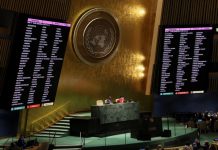Australian Prime Minister Scott Morrison on Tuesday walked back on his earlier move to ban Indians, even Australian citizens, who were trying to leave the coronavirus-hit country and return to Australia..
He backtracked on his decision after several people criticised Morrison’s decision as racist, saying he had “blood on his hands”.
Scott Morrison’s government moved to ban travellers from India from entering Australia until May 15, threatening rule-breakers — including Australian citizens — with prison time.
Amid a widespread backlash, Morrison on Tuesday said it was “highly unlikely” that Australians who skirted a ban would be jailed.
“I think the likelihood of any of that occurring is pretty much zero,” Morrison said in a breakfast-time media blitz on Tuesday.
Around 9,000 Australians are believed to be in India, where hundreds of thousands of new coronavirus cases are being detected every day and the death toll is soaring.
Among those trapped are some of Australia´s most high profile sporting stars — cricketers playing in the lucrative Indian Premier League.
Commentator and former Test cricket star Michael Slater was among those who pilloried Morrison’s decision, saying it was a “disgrace”.
“Blood on your hands PM. How dare you treat us like this,” he tweeted. “If our Government cared for the safety of Aussies they would allow us to get home.”
Morrison said the idea he had blood on his hands was “absurd”.
“The buck stops here when it comes to these decisions, and I’m going to take decisions that I believe are going to protect Australia from a third wave,” he said.
“I’m working to bring them home safely,” he added, indicating that repatriation flights could begin soon after May 15.
Rights group, Morrison’s allies denounce ban move
The decision came into force on Monday and was denounced by rights groups and some of Morrison’s most prominent allies including Sky News commentator Andrew Bolt who said it “stinks of racism”.
Australia has largely avoided the worst of the pandemic through some of the strictest border controls in the world.
There is a blanket ban on travel to-and-from the country unless an exemption is secured.
Non-residents are mostly banned from entering and anyone who does come into the country must carry out a mandatory 14-day hotel quarantine.
But that system has come under increasing strain as the virus has jumped from quarantine facilities and caused a series of outbreaks in the largely unvaccinated community.
The conservative prime minister faces reelection in the next 12 months, and had hoped Australia’s relatively successful handling of the pandemic would propel him to victory.
But the India travel ban and a glacial vaccine rollout have prompted criticism.
Australia has administered 2.2 million vaccine doses out of a population of 25 million people, who each need two doses to be fully immunised.









